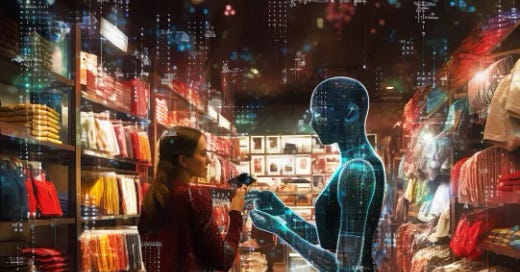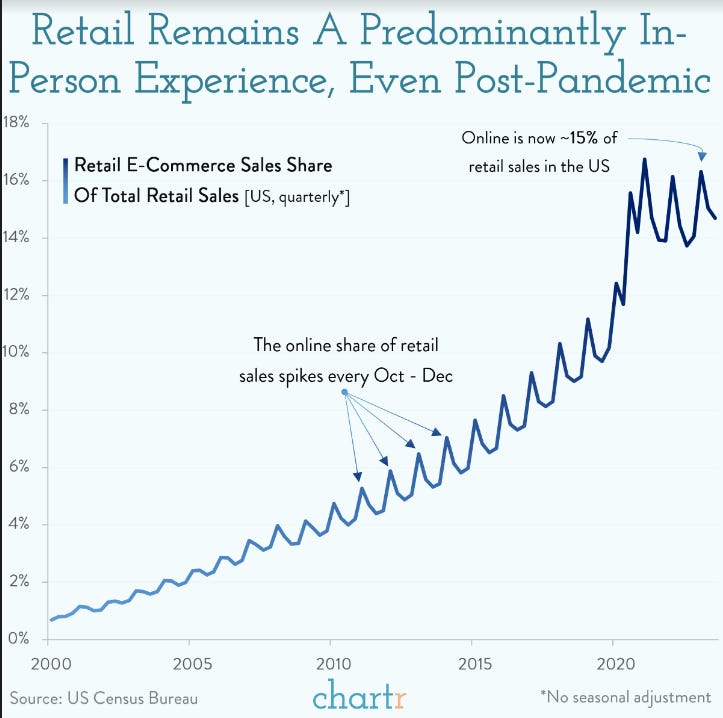Sam Altman Returns, Retail Remains In-Person, Algorithms, and Book Recommendations
Weekly Roundup of AI, Technology, and UX
If you haven’t followed us on Tiktok or Twitter, now is a great chance.
Here’s the latest news, resources, and use cases from the world of product, UX, AI and technology. Let’s go:
🕶️ Sam Altman
🛍️ Retail
🤖 Algorithms
🎥 Deepfakes
📚 Tech Books
Podcast
Creating a Brand - Content, Empathy, and Communication
Felix is an art director and former competitive skier. In this episode, we discuss creating a brand voice and effectively communicating with your audience. This often means embracing new ways of engaging with your audience and meeting customers where they are, which can be difficult for big companies. We talk about companies who do branding and advertising well, and those who do not, and what you can do to reach customers effectively. We also explore the psychology of advertising and the importance of empathy.
News and Useful Reads
Sam Altman is Back at OpenAI
Ending the one of the shortest coups/ousters of all time, Sam Altman has returned as the CEO of OpenAI.
If you’ve been following the drama, you know that Altman was dismissed as CEO on November 17 by the board of OpenAI. Following a chaotic week, he was brought back as CEO late November 22 after most of the company signed a letter saying they would quit unless the board resigned and Altman returned.
The structure of OpenAI is fascinating. It was set up as a non-profit so it could pursue AI but avoid the pitfalls of leading humanity to an AI destruction. But, since all companies need money, it also has a for-profit arm. And that’s where it all gets interesting:
Of course, with Altman’s return, the board will no longer be at odds with him. What was once a feature of OpenAI became a bug that almost took the company down. But it is gone now, for better or worse.
And there is still ongoing speculation about his firing, along with many unanswered questions. Was it AGI related? Was it commercializing AI too quickly without understanding the consequences? All possibilities, according to Reuters:
The sources cited the letter as one factor among a longer list of grievances by the board leading to Altman's firing, among which were concerns over commercializing advances before understanding the consequences. Reuters was unable to review a copy of the letter. The staff who wrote the letter did not respond to requests for comment.
Retail Remains an In-Person Experience
It’s the shopping season for many of us, as we ready ourselves for gift-giving. I do most of my shopping online, but apparently most shopping is still done in-person, which I find surprising.
Many brave the malls and shops themselves, while others click to buy from the comfort of their home using a laptop or phone — but just how much of total retail shopping is actually done online? The answer is actually only about ~15%, although that figure typically rises during this time of the year, according to data from the US Census Bureau.
How algorithms determine what you'll buy for the holidays — and beyond
Speaking of holiday shopping, you can expect that more and more of your shopping will be driven by algorithms in various ways. This isn’t surprising, and we’ll likely see more and more personalization as the reach of technology gets broader.
Algorithmic commerce essentially means retailers use technology, including artificial intelligence, to track and analyze consumer purchases, and predict or suggest other items to buy, according to Haya Ajjan, the associate dean of the Love School of Business at Elon University. Ajjan said that use of the method is growing, with artificial intelligence "reshaping e-commerce and marketing."
What the Doomsayers Get Wrong About Deepfakes
Deepfakes are not new, but they are getting better and more prevalent. And with the help of AI tools, we should expect to see more and more of them.
There is a small academic field, called media forensics, that seeks to combat these fakes. But it is “fighting a losing battle,” a leading researcher, Hany Farid, has warned. Last year, Farid published a paper with the psychologist Sophie J. Nightingale showing that an artificial neural network is able to concoct faces that neither humans nor computers can identify as simulated. Ominously, people found those synthetic faces to be trustworthy; in fact, we trust the “average” faces that A.I. generates more than the irregular ones that nature does.
Other Interesting Finds
20 Great Tech Books to Gift (or Keep for Yourself)
Last week I published my 10 gift ideas for 2023. It’s always one of my favorite posts of the year since I enjoy thinking about some of my favorite books and products and recommending them.
If you’re looking for more recommendations, here are 20 tech books from Wired. I haven’t read all of these, so I’m adding some of them to my reading list as well.









